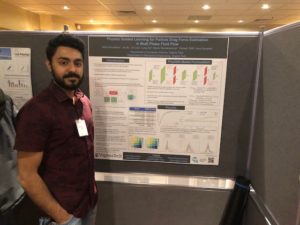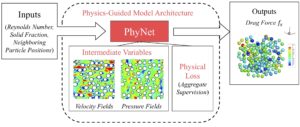DAC Student Spotlight: Nikhil Muralidhar

Nikhil Muralidhar, DAC and UrbComp Ph.D. student in the Department of Computer Science

Graphic is from Muralidhar’s paper on “PhyNet: Physics Guided Neural Networks for Particle Drag Force Prediction in Assembly”
Choosing to pursue a Ph.D. in computer science at Virginia Tech was easy for Nikhil Muralidhar.
“Virginia Tech was my top choice for good reason,” Muralidhar said. “It is known for its quality research and interdepartmental collaborations, for encouraging students to work on real world interdisciplinary applications, and for pioneering programs like UrbComp.”
Also factoring in his decision was the opportunity to join the Discovery Analytics Center.
“I had been following DAC’s track record of high quality, practical research since I was a Virginia Tech undergraduate. I am happy to be part of a rare breed of research labs with both extensive industrial and academic collaborations. The facilities are state-of-the-art and the faculty are approachable, helpful, and use their experience to guide their students to become successful researchers,” said Muralidhar, who is advised by Naren Ramakrishnan.
He is also a research trainee in the National Science Foundation-sponsored multidisciplinary Urban Computing graduate certificate program, which is administered through DAC.
The focus of Muralidhar’s research is on applied machine learning.
Wide applicability and the potential to create widespread impact drew him to the burgeoning fields of data mining and pattern recognition. For example, he said, researchers have been effectively using data mining techniques to forecast influenza seasonal dynamics, while others have trained machine learning models to detect gun shots.
“There have also been applications of machine learning in medicine for the early detection of certain neural disorders, for design of patient-focused cancer treatment programs, and even to aid researchers in the discovery of new potentially life-saving drugs,” said Muralidhar.
In his work, he uses prior domain knowledge to help machine learning models learn more effectively, especially under data paucity or with noisy data.
“I have incorporated prior domain knowledge to multiple domains including computational fluid dynamics as part of a team which developed a physics guided machine learning model for predicting particle drag forces in multi-phase fluid flows,” Muralidhar said.
He said that computational fluid dynamics (CFD), and specifically multi-phase flows (i.e fluid particle systems), are an integral part of propulsion, automobile design, pharmaceuticals, food processing, and many environmental applications. However, because running CFD simulations at fine-grained scales is expensive, researchers generally run coarse grained simulations of systems of interest.
“Coarse grained simulations involve many approximations and abstractions of the underlying physics leading to a degradation of simulation accuracy,” Muralidhar said. “The goal in my research has been to incorporate machine learning models accompanied with the known physics governing a particular CFD process to improve the overall accuracy of the various facets of coarse grained CFD simulation.”
Muralidhar’s paper, “PhyNet: Physics Guided Neural Networks for Particle Drag Force Prediction in Assembly” was published at the 2020 SIAM International Conference on Data Mining.
Included among his other research collaborations are “Detection of False Data Injection Attacks in Cyber-Physical Systems using Dynamic Invariants” at the 2019 IEEE International Conference on Machine Learning and Applications; “Multivariate Long-Term State Forecasting in Cyber-Physical Systems: A Sequence to Sequence Approach” at the 2019 IEEE International Conference on Big Data; “DyAt nets: dynamic attention networks for state forecasting in cyber-physical systems” at proceedings of the 2019 International Joint Conference on Artificial Intelligence; and “Detection of false data injection attacks in power systems using multiplex invariant networks and domain knowledge” at the 2019 IEEE International Conference On Machine Learning And Applications.
Muralidhar, who also holds a master’s degree from George Mason University, is projected to graduate in June 2021. He would like to pursue a career in academic research as part of a research lab or as a faculty member after receiving his Ph.D.